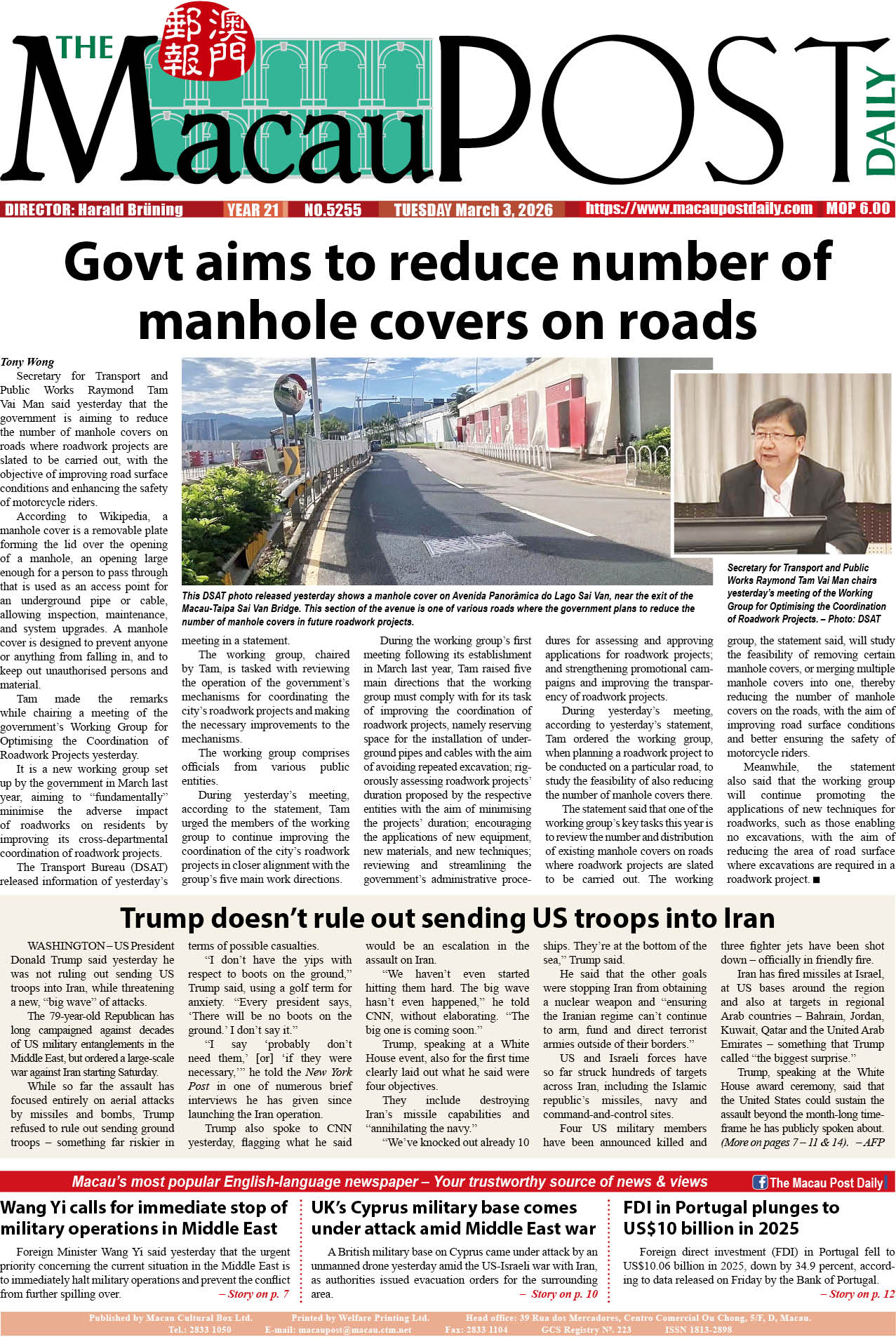Editorial
I talked to US gaming mogul Sheldon Adelson for the first time on May 19, 2004, one day after the uproarious opening of his first local casino, Sands Macao, which was jammed by a crowd of 15,000 lured by false reports of free 200-pataca gaming chips, resulting in scuffles and sheer bedlam that 250 police officers struggled for hours to control.
However, Mr Adelson wasn’t ruffled by the crowd chaos. I met him and his wife Miriam by chance during a visit to the casino when they were looking over an upper-floor balustrade at the crowded gaming hall below, flanked by two bodyguards. Both were visibly pleased with what they saw downstairs. Introducing myself as the local South China Morning Post and Reuters correspondent, I requested an impromptu interview which Mr. Adelson granted without any fuss – and any media minders around.
“No one in Las Vegas would have believed this type of rumour,” Mr Adelson said of the free gaming chip reports, adding that many who had scrambled to gain entry were from Guangdong. He said that he was highly satisfied with the “very good” start, and he described the opening as a “historical occasion”. His wife, a physician by profession, said that when The Venetian casino-hotel opened in Las Vegas in 1999 she had seen crowds similar to those in Macau.
Mr Adelson was quick to add that the huge crowd at the Sands Macao opening “wasn’t really a surprise” to him. He also said that putting an end to Macau’s decades-long casino monopoly was a “sensible decision because competition is generating new business”. He also told me about his plans of turning the future Venetian Macao in Cotai into an international centre for conventions, exhibitions and other events.
Mr Adelson also told me that he was grateful for the Macau government’s assistance in getting his first local casino project off the ground, saying that he had trust in the local authorities. His wife told me that both liked Macau so much that they were considering buying an apartment here, adding that she and her husband were already considering Macau as their “second home.” She also said that Macau with its bridges and river reminded her of San Francisco. Her husband said he was fond of Macau because “it’s a small, picturesque and business-friendly city”. Both said they planned to visit Macau regularly. I don’t know whether they did buy an apartment here (well, probably there was no need for it as they could always stay in one of their hotel suites, but they did pay frequent visits to Macau).
I am fondly recalling my first encounter with the Adelsons because it shaped my lasting impression of them – him as a go-getter from Las Vegas who helped Macau get ahead of its rival gaming city in no time, dethroning it as “The Gambling Capital of the World” (which used to be one of the nicknames of Las Vegas), a crown that Macau has been wearing for quite a while now.
Of course, all this would have been impossible without the vision of the first chief executive of the Macau Special Administrative Region (MSAR), Edmund Ho Hau Wah, the prime mover behind the liberalisation of the gaming industry and the development of a brackish swamp between Taipa and Coloane into what is now known as Cotai. Incidentally, the idea to reclaim the area for a large-scale entertainment project goes back to the 1990s, but the plans remained eggs in moonshine until the Ho government took action.
Of course, we have to thank Mr Adelson for introducing the integrated resort concept to Macau and launching the first such project here – The Venetian Macao. The concept has taken deep roots in Cotai and enabled tens of thousands of local residents and non-resident workers to earn wages that just two decades ago they wouldn’t even have dared to dream of.
In its own right, The Venetian Macao has become one of our city’s top tourist attractions. The Adelson family can be proud of the achievement.
Of course, the road to having been crowned “The Gambling Capital of the World” has occasionally been bumpy, not just for Macau’s gaming industry but for the Adelsons and their company as well, such as delayed, revamped and cancelled projects, acrimonious firings of executive staff members and some high-profile run-ins with the government.
Occasionally, Mr Adelson ruffled a few feathers such as when he told Stanley Ho Hung Sun, then his main local rival, to “get out of the kitchen if you can’t take the heat”. Mr Adelson, a self-made man who started out selling newspapers on the street, certainly had a competitive personality. Little wonder that he became one of the world’s richest men and a very generous benefactor such as for Israel and the Grand Old Party (GOP).
I would like to conclude this editorial by pointing out that – all things considered – Sheldon and Miriam Adelson (one of the strongest impressions of my first encounter with them in 2004 still is that they were VERY dedicated to one another) have played an important role in pushing forward Macau’s development into a world centre of tourism and leisure.
Anyhow, I often visit the Adelsons’ sprawling entertainment complex in Cotai for shopping and eating-out (sorry, I don’t gamble, for Probability was one of my favourite subjects at university), and that’s my very own way of honouring his legacy.
Mr. Adelson passed away in the United States on Monday.
– Harald Brüning






